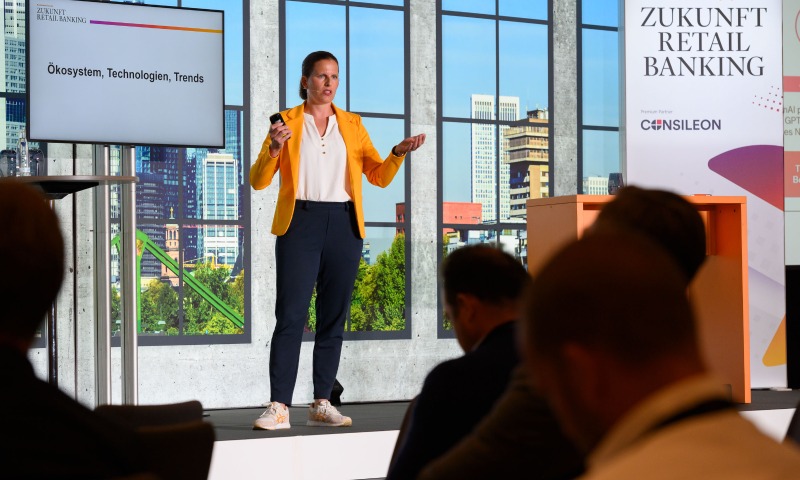Dr. Sina Wulfmeyer is Chief Data Officer and Lead Financial Industries at Unique – a European startup providing an AI-driven conversational platform to better understand customers and build deeper, more meaningful client relationships. She is a proven data specialist for financial applications with over 15 years of experience.
Prior to joining Unique, Sina led various projects in the area of data strategy and applications in a major international bank in Switzerland (Credit Suisse AG). As part of the bank’s largest compliance project, Sina and her team were responsible for standardizing data, defining the legal framework and developing relevant use cases for 20+ international branches of the bank. Previously, she worked as a consultant for a large management consulting firm in Germany and the USA (Accenture AG).
Recently, in an exclusive interview with Digital First Magazine, Dr. Sina shared her insights on the data related challenges faced by the banking industry, professional journey, her current roles and responsibilities as the CDO at Unique, personal source of inspiration, words of wisdom, and much more. The following excerpts are taken from the interview.
In a highly regulated industry such as banking, what can be some of the challenges when it comes to data?
Focusing on enterprise usage of GPT-based functionalities in banking presents several key challenges that need to be addressed. Firstly, data privacy and data protection of client identifying data are crucial considerations. Banks must ensure that customer information remains secure and confidential throughout the chat interactions, implementing robust encryption measures and access controls.
Additionally, regulatory frameworks play a significant role in the deployment of Generative AI in banking. Financial institutions need to comply with relevant laws and regulations governing data privacy, such as the General Data Protection Regulation (GDPR). One example is the “right to be forgotten” which is difficult to adhere to in the generative AI space where key data (like the prompt and output) is stored for model improvements. Adhering to these frameworks ensures that customer data is handled responsibly and in accordance with legal requirements.
Confidentiality, trust, and identity are essential factors for successful adoption of GPTtechnology in banking. Customers must have confidence that their conversations are confidential and protected against unauthorized access. Banks should implement measures to authenticate users, validate identities, and maintain a high level of trust in the chat interactions.
By effectively addressing these challenges, the enterprise usage of GPT-technology in banking can provide customers with convenient and personalized assistance while upholding the highest standards of data privacy, regulatory compliance, confidentiality, trust, and identity protection.
Dr. Sina, tell us about your background path to your current role at Unique?
I am Chief Data Officer and Head of Financial Services at Unique AG – a European tech startup offering a GPT-powered conversational intelligence platform to gain more insights from client conversations. In short: we want to reduce admin work and have more time for clients.
I have started my career in banking where I led various projects in the area of data strategy and applications in a major international bank in Switzerland (Credit Suisse AG). As part of the bank’s largest compliance project, my team and I were responsible for standardizing data, defining the legal framework and developing relevant use cases for 20+ international branches of the bank. Previously, I have worked as a consultant for a large management consulting firm in Germany and the USA (Accenture AG).
In addition, I am a regular speaker and lecturer for Conversational AI (ChatGPT, GPT), Ecosystem Technology and Data. I am an advocate for executive education in data literacy, and mentor young executives in leading hybrid teams.
I hold a PhD in Financial Modeling from the University of St. Gallen (HSG, Switzerland) and a Diploma in Economics from the University of Mannheim (Germany).
As a Chief Data Officer, what is the scope of your activities around data collection, data engineering, data governance, and data management?
As the Chief Data Officer, my scope of activities encompasses overseeing data protection and IT security with a focus on highly sensitive data like client-identifying data (CID). Additionally, I am responsible for leading data engineering efforts, including data integration, transformation, and storage, to enable efficient controls, analysis and reporting. Moreover, I establish and enforce data governance policies and frameworks, ensuring compliance with data regulations, data quality standards, and data privacy requirements, while also managing data assets and their lifecycle across the organization. This has recently been recognized by successful ISO certifications (ISO 27001 and 9001).
According to you, what data considerations need to be in place for AI and ML projects?
- Data quality: Ensuring the data used for AI projects is accurate, complete, and reliable is crucial.
- Data privacy and security: Safeguarding sensitive and personally identifiable information (PII) is paramount. Implementing data anonymization techniques, access controls, encryption, and adhering to relevant privacy regulations (e.g., GDPR, Swiss Data Protection rules) are essential considerations.
- Data governance: Establishing clear guidelines and processes for data ownership, data access, and data lifecycle management helps maintain data integrity, consistency, and compliance across the organization.
- Data and AI ethics: Assessing the ethical implications of the data used, potential biases, and unintended consequences of AI models is important to ensure fairness, accountability, and avoid perpetuating discriminatory practices.
How are you taking a holistic approach to data and focusing on people, process, and technology at Unique?
Client-Centric Mindset is key: we start with the customer first and work backwards. We put the end-user at the center of our strategy, understanding their needs, pain points, and expectations to provide the best experience.
Within our company, we foster cross-department collaboration between data scientists, developers, product managers, legal experts and domain experts to ensure a well-rounded approach to data and AI. In addition, we implement agile practices to enable flexibility and adaptability in response to changing requirements and market dynamics (e.g., new AI models evolving).
At the core, we want to build a scalable and robust infrastructure capable of handling the data processing, storage, and computational requirements of GPT-based solutions in the cloud while ensuring highest level of data protection and IT security (focus: use case in the financial services industry).

What are some interesting insights you’ve discovered when it comes to data in the banking industry?
Banking data is fascinating due to its vastness, encompassing a wealth of information, including customer behavior, financial transactions, and account activity. Moreover, it offers meaningful insights that span across various client groups, locations, and departments, enabling a holistic approach to areas like fraud detection, risk assessment, and customer segmentation.
What AI technologies are you most looking forward to in the coming years?
Personalized Financial Advice: AI can analyze customer data, including transaction history, spending patterns, and investment preferences, to offer personalized financial advice.
Risk Assessment and Credit Scoring: AI algorithms can analyze extensive data sources, including credit history, social media profiles, and transaction data, to assess creditworthiness and calculate risk scores.
Fraud Detection and Prevention: AI algorithms are being employed to enhance fraud detection and prevention systems in banking. By analyzing large volumes of data, AI can identify patterns and anomalies indicative of fraudulent activity.
Where or whom do you seek motivation and inspiration from? How?
I seek motivation and inspiration from my network of professionals and friends, as well as through extensive reading (articles, papers, books, newsletters, LinkedIn). Furthermore, I make a conscious effort to disconnect from the digital realm and spend time outdoors. Immersing myself in nature helps me to reflect, recharge, and find inspiration. The tranquillity and beauty of the natural world often provides a fresh perspective and allows me to connect the dots in unexpected ways.
What’s a leadership lesson that you’ve learnt that’s unique to being a female leader?
Being a female leader in tech requires a strong network, which starts by helping others and being willing to give and invest in their growth. Building genuine connections and supporting others in the industry can help create opportunities for collaboration and advancement. I also place a strong focus on client relationships: by understanding the needs and expectations of clients, I can deliver innovative solutions that address real-world challenges and drive business growth.
What advice would you give to women who want to pursue a career in tech?
Believe in Yourself: Have confidence in your abilities and believe that you can succeed in the tech industry (but do your homework: know your tools, programming skills, etc. while fostering continuous learning to stay relevant).
Which use cases do you currently implement for banks and insurances?
Our team at Unique is serving leading banks and insurances in Switzerland and Europe. Currently, we work on three main use cases:
- Documentation:In the banking sector, meticulous documentation and compliance regulations are paramount. AI and ChatGPT have emerged as invaluable assets in streamlining the documentation process, boosting efficiency, and ensuring adherence to regulatory requirements. By leveraging the power of AI-driven natural language processing (NLP), ChatGPT can analyze complex banking documents, including loan agreements, mortgage contracts, and insurance policies.
- Automation:AI and ChatGPT enable banks to automate repetitive and time-consuming tasks, empowering employees to focus on higher-value activities and enhancing operational efficiency (e.g. automatically suggest a AI-based follow-up email).
- Data Extraction from Internal Sources:Banks generate massive amounts of data, encompassing customer transactions, market trends, payment data and more. By leveraging advanced machine learning algorithms, ChatGPT can analyze unstructured data such as customer feedback, emails, recorded client conversations and support tickets. This analysis provides banks with a deeper understanding of customer sentiments, preferences, and needs. These insights, in turn, inform product development, drive effective marketing strategies, and enable personalized customer experiences.
It is important to note that in Europe and Switzerland we have very high data protection standards and we have invested a lot in training users (“human in the loop”) and also our Unique Compliance Layer to make sure all client data is save at all times (e.g. encryption, lockbox concept, privileged access management, pseudonymization, advanced trainings, privacy-by-design and privacy-by-default user journey design).






